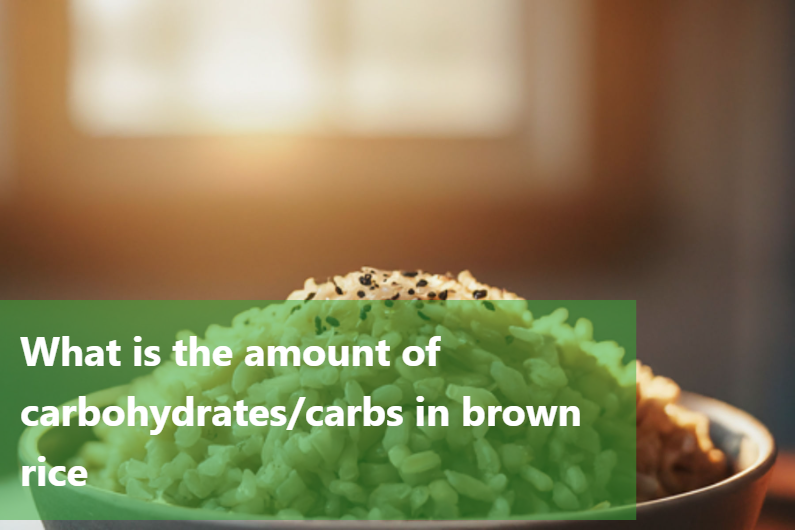Brown rice is highly beneficial for your health as it contains abundant fiber, protein, and minerals, providing your body with substantial energy. It also contains 23g of carbohydrates, but concerns about its carbohydrate content are unfounded since the carbohydrates in brown rice are unique—they release energy gradually, avoiding sharp increases in blood sugar levels. Moreover, brown rice is rich in magnesium, selenium, and vitamin B6, facilitating the efficient utilization of carbohydrates for energy production. Unlike processed foods, brown rice doesn't lead to sudden sugar spikes. Incorporating brown rice into your diet can contribute to your overall health and vitality. It serves as a valuable source of carbohydrates that your body can effectively utilize.
Understanding Carbohydrates in Brown Rice
When examining nutrition labels, terms like "complex carbohydrates" can be perplexing, but whole grains such as brown rice exemplify their direct health benefits. Brown rice not only provides a reliable energy source but also aids digestion and weight management due to its complex carbohydrates. These carbohydrates are slowly broken down into sugars, preventing sudden energy spikes followed by fatigue typical of simple sugars. Brown rice offers sustained energy levels and enhances both physical and mental endurance through the gradual release of glucose from its fibrous carbohydrates. Additionally, its soluble fiber promotes satiety, aids digestion, and supports fat burning by nourishing beneficial gut bacteria. Opting for brown rice is a wise choice for overall health, offering both fiber and energy. Its complex carbohydrates ensure balanced energy levels and improved digestion, making it a straightforward yet comprehensive approach to maintaining health and optimal performance.
Nutritional chart of Brown rice:
Amount Per 100 grams |
|
|
|
Calories |
111 |
|
|
% Daily Value* |
|
|
|
Total Fat |
0.9 g |
1% |
|
Saturated fat |
0.2 g |
1% |
|
Cholesterol |
0 mg |
0% |
|
Sodium |
5 mg |
0% |
|
Potassium |
43 mg |
1% |
|
Total Carbohydrate |
23 g |
7% |
|
Dietary fiber |
1.8 g |
7% |
|
Granulated Sugar |
0.4 g |
|
|
Protein |
2.6 g |
5% |
|
Vitamin C |
0% |
Calcium |
1% |
Iron |
2% |
Vitamin D |
0% |
Vitamin B6 |
5% |
Cobalamin |
0% |
Magnesium |
10% |
|
|
*Per cent Daily Values are based on a 2,000 calorie diet. Your daily values may be higher or lower depending on your calorie needs.
Health Benefits of Brown Rice Carbohydrates
Consistent Energy Source - The complex carbohydrates in brown rice break down gradually, preventing sudden spikes in blood sugar levels and providing sustained energy.
Aid in Weight Management - The high fiber content of brown rice promotes a feeling of fullness, leading to reduced overall food intake. Additionally, it supports the growth of beneficial gut bacteria, which is associated with easier weight control.
Beneficial for Cholesterol Levels - The combination of oil and fiber in brown rice works together to remove excess cholesterol from the body, thereby promoting heart health.
Support for Diabetes Management - Brown rice, with its carbohydrates that are gentle on the system, helps in stabilizing blood sugar levels, and minimizing fluctuations.
Potential in Fighting Cancer - Antioxidants such as vitamin E and phenolics found in brown rice play a role in neutralizing and eliminating harmful free radicals, which can contribute to preventing cancer development.
How to add brown rice to your diet
Replace White Rice: Gradually start replacing white rice with brown rice in your meals.
Experiment with Recipes: Try different recipes with brown rice, such as stir-fries, pilafs, and salads to find new ways to incorporate it into your diet.
Pair with Vegetables and Proteins: Use brown rice as a base for a variety of vegetable and protein dishes, creating a balanced and nutritious meal.
Portion Control: Pay attention to portion sizes, as brown rice is slightly higher in calories than white rice.
Make it a Habit: Incorporate brown rice into your regular meal rotations to develop a habit of consuming it regularly.
Bottom line:
Put simply, brown rice provides beneficial carbohydrates for your body. Unlike other high-carb foods, it releases energy gradually, aiding in sustained focus and strength. Additionally, it promotes a feeling of fullness, and aids in weight management by improving digestion and increasing fat burning. Moreover, brown rice contributes to lowering bad cholesterol levels, reducing the risk of heart diseases, and maintaining gut health. Therefore, despite carb avoidance concerns, brown rice offers numerous advantages and can be incorporated into a healthy diet. Its combination of good carbs and fiber provides lasting energy for both body and mind, promoting overall health. Hence, choosing brown rice for your meals is a wise decision.
This Blog post is an initiative by DiabeSmart, to provide accurate and Nutritionist / Doctor approved information related to Diabetes. DiabeSmart is India's first Food brand designed specifically for Diabetics, that has been clinically tested on Diabetics and Pre-Diabetics to deliver 55% - 70% lower Sugar spikes. DiabeSmart is part of Lo! Foods - India's leading brand for Everyday Functional Health foods.









